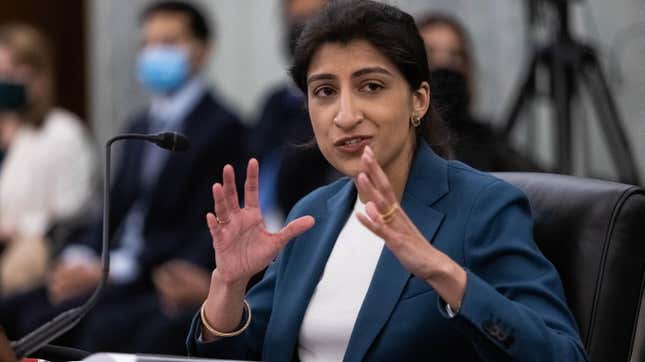
The first few months of Joe Biden’s presidency were marked by the recruiting of what some called an “Antitrust All-Star Team.” Spearheaded by dogged Amazon critic Lina Khan, antitrust scribe Tim Wu, and longtime Google annoyance Jonathan Kanter, that dream team has little to show for itself, so far. Despite plenty of anti-monopolistic, pro-worker blustering, company mergers and acquisitions reached a record pace in 2021, with over 1,047 deals struck worth at least $100 million each. Now, nearly one year after Biden assumed office, two of his top competition enforcement agencies are vying to reevaluate—and potentially rewrite—merger and acquisition guidelines in ways they argue could give them a fighting chance against a growing tidal wave of economic consolidation
In a press conference on Tuesday, the Federal Trade Commission and Department of Justice announced they are jointly launching a public inquiry to revise and strengthen their merger and acquisition guidelines to better detect and prevent anti-competitive corporate business practices. Though both agencies were tight-lipped on their specific policy preferences, they said the public comment process is intended to ensure the agencies’ rules and guidelines are up to the task of handling a modern economy currently undergoing a radical digital transformation.
“The supply chain no longer follows a simple upstream or downstream path,” DOJ Assistant Attorney General Jonathan Kanter said during the press conference. “It’s interconnected in complex and evolving ways.” Kanter went on to say digital technologies have revolutionized not just the goods and services everyday consumers use but, “the nature of industry, at its core.”
While the public inquiry will look broadly at the agencies’ guidelines, FTC chair Lina Khan outlined three areas of most importance. First, the agencies want to find out whether or not the current guidelines are “attentive to the range of business strategies and incentives that might drive acquisition.” Second, Khan said the agencies are interested in knowing if the current guidelines adequately assess whether mergers are harming workers. (Seemingly included in this question is scrutiny of the consumer harm principle, which up until now has allowed for mergers so long as they do not result in increased prices). But as any Amazon warehouse worker or breached Facebook user will attest, prices may only tell part of the story with modern tech business practices. Finally, the agencies want to know if the current guidelines are “unduly limited in their focus on particular types of evidence.”
Though neither Khan nor Kanter advocated for any particular type of reform, it was clear they weren’t exactly pleased with the current merger onslaught. According to Khan, the FTC and DOJ last year received more than double the number of merger filings than in any of the past five years. “We need to ensure our tools of today allow us to understand the markets of today,” Kanter said.
“Illegal mergers can inflict a host of harms, from higher prices and lower wages to diminished opportunity, reduced innovation, and less resiliency,” Khan said in a statement. “This inquiry launched by the FTC and DOJ is designed to ensure that our merger guidelines accurately reflect modern market realities and equip us to forcefully enforce the law against unlawful deals.”
The agencies’ call to action came literally hours after Microsoft announced its intention to acquire video game publishing giant Activision for a gargantuan price tag just short of $69 billion. Representatives from both the FTC and the DOJ declined to comment specifically on the Microsoft acquisition during the press conference, but both acknowledged that the recent rise in acquisitions across the board has strained their resources thin.
The public inquiry also comes about six months after President Biden signed a wide-ranging executive order directing the FTC and DOJ to rein in monopolistic corporate practices. That order contained 72 separate initiatives with a particular focus on adding enforcement mechanisms to target Big Tech business practices. So far though, the order has proven mostly symbolic.
Despite an apparent appetite for more aggressive anti-monopolistic enforcement mechanisms, federal agencies have found themselves subject to restrictive rules and lengthy court battles that limit their efficacy. A review process could alter the former, but representatives declined to comment on what, if any, effect those revamped guidelines would have on the seemingly inevitable tussle with courts.
The FTC and DOJ’s initial comment period is open for 60 days. After that, the agencies said they will release a draft with updated guidelines and seek more comments before finalizing them. The agencies said they are optimistically looking to finish this by the end of the year.